1061 scholarly books by Catholic University of America Press and 36
start with F
1061 scholarly books by Catholic University of America Press and 36
1061 scholarly books by Catholic University of America Press
36 start with F start with F
36 start with F start with F
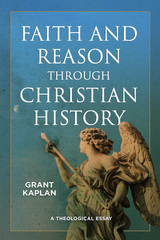
Faith and Reason through Christian History
A Theological Essay
Grant Kaplan
Catholic University of America Press, 2022
It is impossible to understand the history of Christian theology without taking into account the relationship between faith and reason. Many works give an overview of faith and reason, or outline key principles, while others put forward a thesis about how one should understand the relationship between faith and reason. In this theological essay, Grant Kaplan revisits the key figures and debates that shape how faith and reason relate. Divided into three parts, Kaplan invites readers into a conversation rather than a drive-by. Readers will encounter the words and arguments of some of Christianity’s greatest thinkers, some well-known (Augustine, Aquinas, Newman) and others nearly forgotten. Readings of these figures bring them to life in an accessible manner.
In Faith and Reason through Christian History, the roughly fifty figures treated are given sufficient room to breathe. Rather than simply summarizing their thought, Kaplan traces their arguments through key texts. This book will appeal to a range of audiences: theologians and philosophers, instructors, graduate students, seminarians, lay study groups, and undergraduate theology majors. No book today accomplishes what this book does!
[more]
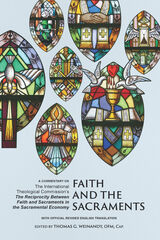
Faith and the Sacraments
A Commentary on The International Theological Commission's The Reciprocity of Faith and Sacraments in the Sacramental Economy: With Official Revised English Translation
Thomas G. International Theological Comission
Catholic University of America Press, 2022
In September of 2014 thirty new members were appointed for a five-year term to the Vatican’s International Theological Commission. These theologians, clerical and lay, were chosen from twenty-six different countries and from five continents. The commission was charged with composing three documents of contemporary theological importance, one of which was that of the relationship between faith and the sacraments. This finished document was published, with the approval of the Congregation for the Doctrine of the Faith and by Pope Francis in Spanish in early 2020 under the title: La Reciprocidad entre Fe y Sacramentos en la Economía Sacramental. A subsequent English translation was published thereafter under the title The Reciprocity Between Faith and Sacraments in the Sacramental Economy.
This present volume contains the text of the English translation. There follows an introduction by a member of the ITC, Thomas G. Weinandy, OFM, Cap., and subsequently followed by six explanatory and interpretive commentaries on various chapters of the document. Dr. John Yocum considers the contemporary relevance of the topic. Dr. Christopher Ruddy examines the dialogical nature of the sacramental economy of salvation. Dr. Jennifer Holmes Martin discusses the relationship between faith and the sacraments of initiation. There are two commentaries for section four concerning faith and the sacrament of marriage. Professor John Grabowski treats the strictly theological issues relating to faith and marriage. Canonist Timothy Cavanaugh takes up the canonical issues regarding faith and its relationship to enacting a valid sacramental marriage. Dr. Daniel Keating rounds off the commentaries by surveying the conclusion of the document, that is, the present need for evangelization so as to enliven the faith of the faithful, and the present relevance of the new ecclesial movements within the Church today.
These commentaries are aimed at aiding priests and seminarians as they address or prepare to address the pastoral and theological concerns they encounter or will encounter on a daily basis. This volume could also be used in parish adult education groups as well, wherein the laity could better understand the relationship between faith and the sacraments.
[more]
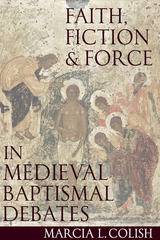
Faith, Force and Fiction in Medieval Baptismal Debates
Marcia L. Colish
Catholic University of America Press, 2014
Drawing on a wide and interdisciplinary range of sources that goes well beyond the writings of theologians and canonists to include liturgical texts and practices, the rulings of popes and church councils, saints' lives, chronicles, imaginative literature, and poetry, Faith, Fiction and Force in Medieval Baptismal Debates illuminates the emergence and fortunes of these three controversies and the historical contexts that situate their development. Each debate has its own story line, its own turning points, and its own seminal figures whose positions informed its course. The thinkers involved in each case were, and regarded one another as being, members of the orthodox western Christian communion. Thus, another finding of this book is that Christian orthodoxy in the Middle Ages was able to encompass and accept disagreements both wide and deep on a sacrament seen as fundamental to Christian identity, faith and practice.
[more]
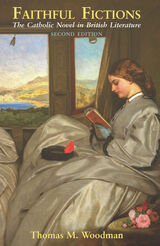
Faithful Fictions
The Catholic Novel in British Literature
Thomas M. Woodman
Catholic University of America Press, 2022
Catholic writers have made a rich contribution to British fiction, despite their minority status. Evelyn Waugh, Graham Greene, and Muriel Spark are well-known examples, but there are many other significant novelists whose work has a Catholic aspect. This is the first book to survey the whole range of this material and examine whether valid generalizations can be made about it. In charting such fiction from its development in the Victorian period through to the work of contemporaries such as David Lodge, the author analyses its complex relationships with changes in British society and the international Church. There is more than one way of being a Catholic, as Woodman shows, but he also demosntrates that many of these writers share common themes and a distinctive perspective. They often wish in particular to use their religion as a weapon against what they portray as a complacent Protestant or secular society. Their consciousness of writing in the midst of such a society gives a special edge to their treatments of the perennial Catholic themes of suffering, sin and sex. It also has implications for literary form and relates to what has been seen as the extremist mode of Catholic fiction. The final question that Woodman puts is whether the changes in the Church since the Second Vatican Council must inevitably lead to the loss of this distinctive Catholic contribution to the novel.
[more]
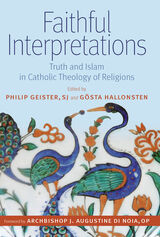
Faithful Interpretations
Truth and Islam in Catholic Theology of Religions
Philip Geister
Catholic University of America Press, 2021
”Theology of Religions” is among the most burning issues within Christian theology today. The challenge to study and discuss different ways of handling conflicting truth claims and religious narratives between religions is taken up by a growing number of theologians across denominational boundaries. This is a common and ecumenical effort undertaken by Christian theologians all over the world. And yet, the impact of specific ecclesiastical or theological traditions on different concepts of theology of religions should not be underestimated. As well known, the Second Vatican council with its pivotal decree Nostra Aetate (On the relation to other religions) not only set the agenda for Catholic theology, but even influenced the wider discussion on the topic. The papers of this volume were all given at a conference in Uppsala, Sweden in October 2017. The structure of Faithful Interpretations follows closely the way the conference was conducted.
A general introduction to the development and present status of ”Theology of Religions” by Marianne Moyaert opens the book. Archbishop J Augustine Di Noia of the Vatican Congregation for the Doctrine of Faith then treats the recent developments in the teaching of the Magisterium regarding theology of religions. Anna Bonta Moreland adresses the issue of Muhammad and Christian Prophecy. Diego R Sarrió Cucarella focuses on early Christian theological views of Islam and concludes that Islam has been from the begining a ”disturbing” factor in the Christian view of salvation history. Wilhelmus G B M Valkenberg discusses the impact of Nostra Aetate on the Church’s relation to Muslims, using especially the precedent of Nicolaus of Cues as regards a constructive approach to Islam. Klaus von Stosch adresses a sensitive issue in Muslim-Christian relations and illustrates the advantages of the comparative theology approach for the theology of religions.
Complementing this perspective, Peter Jonkers offers a hermeneutical perspective on truth claims, and reflects on ”the religious Other” with references to Jacques Derrida among others. Reinhold Bernhardt argues in favour of a biblically grounded “relational-existential” theory of truth, which would be most helpful with regard to other religions. To conclude, the prominent Catholic specialist on Theology of Religions, Gavin D’Costa, widened the perspective by addressing the relation to Judaism from the point of view of the covenant and the promises of the land. Altogether, the papers of this volume give a clear impression of the status of Roman Catholic Theology of Religions.
[more]
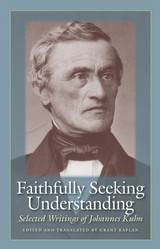
Faithfully Seeking Understanding
Selected Writings of Johannes Kuhn
Johannes Kuhn
Catholic University of America Press, 2009
Faithfully Seeking Understanding provides a first-hand opportunity for English-speaking readers to encounter the thought of Johannes Kuhn (1806-1887), widely considered the greatest speculative theologian of the renowned Catholic Tübingen School.
[more]
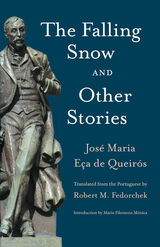
The Falling Snow and Other Stories
José Maria Eça de Queirós
Catholic University of America Press, 2022
The great nineteenth-century Portuguese author José Maria Eça de Queirós (1845-1900) has long been known for his novels, especially The Crime of Father Amaro (1880) and The Maias (1888). However, he also wrote short stories, and a number of them, having stood the test of time, are now regarded as masterpieces. Although there is no question that Eça owes the lion’s share of his reputation to his long fiction, the tales in this collection tell us that we are reading the work of a writer in full control of both genres.
The eleven selections range widely in theme and length and, except for “The Catastrophe”(which was published posthumously), are arranged in order of the year of publication. “The Falling Snow” and “Master Devil” contain elements of both the fantastic and realistic, a number of which call to mind Edgar Allan Poe, a writer whom Eça read and greatly admired. The power of love becomes the obsession of love in “The Peculiarities of a Blonde Girl” and “José Matias,” two of the stories that stand at the pinnacle of Eça’s reputation as a short story writer. “Civilization” will speak to nostalgia for a rustic life, while “Perfection” searches, through Ulysses and a special goddess, into a different kind of life, one without blemish. Other tales explore the nature of sacrifice (“The Wet Nurse”), greed and betrayal (“The Treasure”), jealousy and vengeance (“The Dead Man”), and faith in a young rabbi named Jesus (“The Gentle Miracle”). No one knows why Eça withheld publication of “The Catastrophe,” but this powerful story engages us with its naked intensity, its aroused passion, and its blunt honesty, for it amounts to a ringing endorsement of the exalted meaning of patriotism.
[more]

The Family as Basic Social Unit
Living Out Catholic Social Teaching
Kevin Schemenauer
Catholic University of America Press, 2024
The Family as Basic Social Unit seeks to take seriously the claim that a family is a basic social unit. As a basic social unit, a family is both internally social, and socially interdependent with other communities. Since a family is a basic social unit, Schemenauer proposes that family life is a location for applying Catholic social teaching. Kevin Schemenauer specifically applies Catholic social principles concerning the dignity of work and peacemaking to household labor and violence among siblings, and he reflects on how individuals feed the hungry and care for the sick when they care for their family members. In the second part of the volume, Schemenauer describes the social interdependence of families. He analyzes the relationship between families and the Church, civil society, the economy, and the state. Schemenauer proposes that the question for families is not whether to engage with other social communities but how to do so well. He explicitly highlights how consumer capitalism creates obstacles for families attempting to live as a basic social unit. Then, employing the categories of infused simplicity and moral cooperation, he provides a framework for discerning family engagement with broader society. Finally, Schemenauer analyzes the relationship between family commitments and social ministry. Working from the family outward, Schemenauer describes how family commitments can motivate broader social service, but then employs the example of families involved in the Catholic Worker Movement to reflect on the joys and dangers of balancing commitment to one’s family with social ministry focused on the urgent needs of those outside of one’s household.
[more]

The Fantasy of J.R.R. Tolkien
Mythopeia and the Recovery of Creation
Robert J. Dobie, Robert J.
Catholic University of America Press, 2024
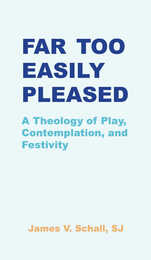
Far Too Easily Pleased
A Theology of Play, Contemplation, and Festivity
James V., SJ Schall
Catholic University of America Press, 2020
Far Too Easily Pleased was originally published in 1976, although it is just as relevant today. Catholic Education Press is thrilled to be able to bring this book back into print. To summarize the volume we can do better than to excerpt part of Fr. Schall’s introduction to the 1976 edition:
This book is intended to be a helpful stimulus to incite the reader to survey the truly exciting literature in this field and to assist in organizing personal reflection about the basic themes of game, play, wonder, rite, contemplation and festivity, themes that the theology of play naturally suggests. For it can be truly said that those who have not yet been initiated into this style of religious and cultural thought have been missing highly liberating and ennobling levels of our heritage. For those who already know what rewards are to be found in play and game, it is hoped that this book can again be a fresh and different approach to wonder and fascination, to the curiously marvelous life we have been given.
James V. Schall, SJ, (1928-2019) was an American Jesuit Roman Catholic priest, teacher, writer, and philosopher. He retired in 2012 after a long tenure as a professor of political philosophy at Georgetown University Among his many books are The Universe We Think In; Political Philosophy and Revelation: A Catholic Reading; The Mind That Is Catholic: Philosophical and Political Essays; Schall on Chesterton: Timely Essays on Timeless Paradoxes and At the Limits of Political Philosophy: From “Brilliant Errors” To Things of Uncommon Importance (all CUA Press).
[more]
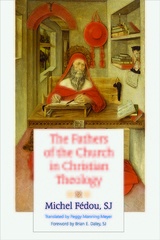
The Fathers of the Church in Christian Theology
Fedou
Catholic University of America Press, 2019
The main purpose of The Fathers of the Church in Christian Theology is to argue that Patristic studies still has much to contribute to theological reflections in our time. Throughout history, the reading of the Fathers of the Church has made major contributions to Christian thinking. This fecundity was notably verified in the 20th century through the work of theologians like Henri de Lubac and Hans Urs von Balthasar. It was as well manifested broadly in the life of the church that, with the Vatican II council, drew from the patristic tradition a source of inspiration for its own renewal.
However, even though the research and work on early Christianity has experienced considerable growth for several decades, Christian theology is today confronted with new questions. Thus, what status to recognize in the exegesis of the Fathers? Has not the distance from the heritage of patristic thinking been widened? More radically, do not the demands of contextual theologies on diverse continents compel a distancing away from some traditions that formerly were principally limited to Mediterranean and European regions?
If these questions must be taken into account, they, nevertheless, cannot dispense with Christian theology being, today as yesterday, inspired and made fecund by the writings of the Fathers. Michel Fédou attempts to shed light on what, in our own era, justifies the necessity of a patristic theology. He shows how the reading of the Fathers contributes to the understanding of the faith in the different fields of Christian thinking. It highlights the importance of their writings for the spiritual life and the valuable nourishment that they thus offer to our times.
[more]
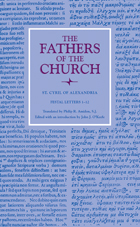
Festal Letters 1-12
St. Cyril of Alexandria
Catholic University of America Press, 2013
No description available
[more]
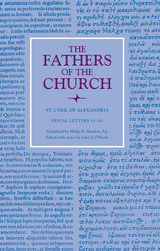
Festal Letters 13-30
St. Cyril of Alexandria
Catholic University of America Press, 2013
Twenty-nine in all, these letters cover all but three of Cyril's years as a bishop. The first twelve were published in 2009 (Fathers of the Church 118). The present volume completes the set. Festal letters were used in Alexandria primarily to announce the beginning of Lent and the date of Easter. They also served a catechetical purpose, however, allowing the Patriarch an annual opportunity to write pastorally not just about issues facing the entire see, but also about the theological issues of the day.
[more]
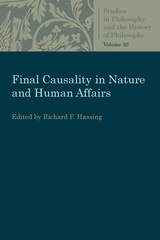
Final Causality in Nature and Human Affairs
Richard F. Hassing
Catholic University of America Press, 2018
This study of the questions of final causality is arranged in historical order from Aristotle to contemporary anthropic-principle cosmology. It discusses such teleological issues as chance and providence, and Aristotle's definition of nature in relation t
[more]
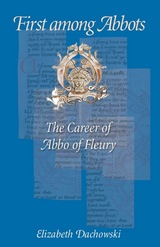
First among Abbots
The Career of Abbo of Fleury
Elizabeth Dachowski
Catholic University of America Press, 2008
Presents a coherent picture of this multifaceted man with an emphasis on his political alliances and the political considerations that colored his earliest biographical treatment.
[more]
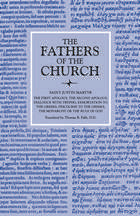
The First Apology, The Second Apology, Dialogue with Trypho, Exhortation to the Greeks, Discourse to the Greeks, The Monarchy or The Rule of God
Saint Justin Martyr
Catholic University of America Press, 1965
No description available
[more]
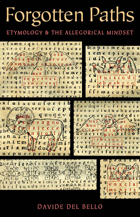
Forgotten Paths
Etymology and the Allegorical Mindset
Davide Del Bello
Catholic University of America Press, 2007
In Forgotten Paths, Davide Del Bello draws on the insights of Giambattista Vico and examines exemplary texts from classical, medieval, and Renaissance culture with the intent to trace the links between etymological and allegorical ways of knowing, writing, thinking, and arguing
[more]
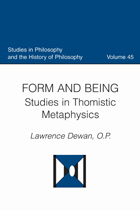
Form and Being
Studies in Thomistic Metaphysics (Studies in Philosophy and the History of Philosophy, Volume 45)
Lawrence Dewan, O.P.
Catholic University of America Press, 2006
Contains thirteen essays by Lawrence Dewan on metaphysics, the vision of reality from the viewpoint of being.
[more]
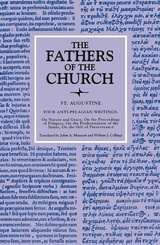
Four Anti-Pelagian Writings
Saint Augustine
Catholic University of America Press, 1992
No description available
[more]
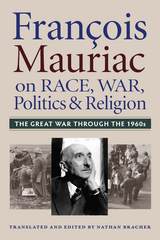
Francois Mauriac on Race, War, Politics and Religion
Nathan Bracher
Catholic University of America Press, 2016
Nathan Bracher's François Mauriac on Race, War, Politics, and Religion: The Great War Through the 1960s consists of a selection of some ninety editorials penned by the Catholic novelist and intellectual François Mauriac, who received the Nobel Prize for literature and who was admitted to the Académie Française in 1933. As is often the case for prominent writers and intellectuals in France, Mauriac became active in political punditry early in his career, at the time of the First World War. Intensifying notably in the tumultuous years of the 1930s on, this activity continues to expand over the next five decades. After 1952, Mauriac's editorials came to represent the most important dimension of his intellectual activity. He was, to cite the prominent journalist and intellectual Jean Daniel of Le Nouvel Observateur, Frances most distinguished and formidable editorialist of the twentieth century.
[more]

Free Markets with Solidarity and Sustainability
Martin Schlag
Catholic University of America Press, 2016
The contributors to Free Markets with Sustainability and Solidarity, who represent a unique combination of European and American scholars, present their reflections on evolving forms of economics. All are unified by a holistic, Christian anthropology, from which they draw epistemological consequences for free markets and a free society.
[more]
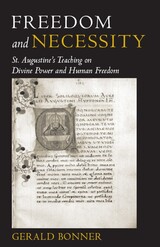
Freedom and Necessity
St. Augustine's Teaching on Divine Power and Human Freedom
Gerald Bonner
Catholic University of America Press, 2007
This book seeks to explain this paradox in Augustine's theology by tracing how these different emphases arose in his thought, and speculating as to why he endorsed, in the end, his theology of predestination. T
[more]
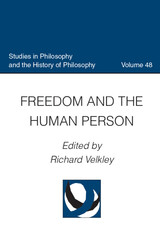
Freedom and the Human Person
Richard Velkley
Catholic University of America Press, 2007
The present collection seeks to contribute toward finding that distance by making the tradition of thought more a living reality and not an object of arid analyses. Unlike most collections the present one transcends disciplinary boundaries, as it acknowledges the interconnectedness of philosophical, theological, and political arguments on these themes.
[more]
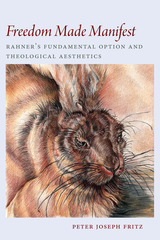
Freedom Made Manifest
Peter Joseph Fritz
Catholic University of America Press, 2019
Freedom Made Manifest explicates Rahner’s theology of freedom by elucidating its configuration and sources. Much of its inquiry centers on the fundamental option: each human person’s eternal decision made, paradoxically, in time, as a definitive answer to God’s personally-tailored call to salvation. This idea stems from three principal sources: Catholic conversations with transcendental-idealist philosophy, penitential theology and practice, and Ignatian spirituality. Rahner’s unique redeployment of these sources inflects the fundamental option with theologies of concupiscence, mercy and forgiveness (especially as ecclesially mediated), and devotion to Jesus Christ. Awareness of these inflections can show how Rahner’s theology of freedom may assist in theological reflection on freedom’s susceptibility to injury and trauma.
[more]
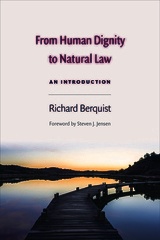
From Human Dignity to Natural Law
An Introduction
Richard Berquist
Catholic University of America Press, 2019
From Human Dignity to Natural Law shows how the whole of the natural law, as understood in the Aristotelian Thomistic tradition, is contained implicitly in human dignity. Human dignity means existing for one’s own good (the common good as well as one’s individual good), and not as a mere means to an alien good. But what is the true human good? This question is answered with a careful analysis of Aristotle’s definition of happiness. The natural law can then be understood as the precepts that guide us in achieving happiness.
To show that human dignity is a reality in the nature of things and not a mere human invention, it is necessary to show that human beings exist by nature for the achievement of the properly human good in which happiness is found. This implies finality in nature. Since contemporary natural science does not recognize final causality, the book explains why living things, as least, must exist for a purpose and why the scientific method, as currently understood, is not able to deal with this question. These reflections will also enable us to respond to a common criticism of natural law theory: that it attempts to derive statements of what ought to be from statements about what is.
After defining the natural law and relating it to human or positive law, Richard Berquist considers Aquinas’s formulation of the first principle of the natural law. It then discusses the love commandments to love God above all things and to love one’s neighbor as oneself as the first precepts of the natural law. Subsequent chapters are devoted to clarifying and defending natural law precepts concerned with the life issues, with sexual morality and marriage, and with fundamental natural rights. From Human Dignity to Natural Law concludes with a discussion of alternatives to the natural law.
[more]
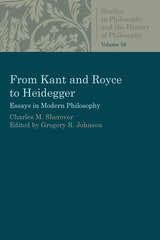
From Kant and Royce to Heidegger
Essays in Modern Philosophy
Charles Sherover
Catholic University of America Press, 2019
In this study, Charles M. Sherover argues that there is a single, substantial line of development that can be traced from the work of Leibniz through Kant and Royce to Heidegger. Sherover traces a movement from deep within the roots of German idealism through Royce's insights into American pragmatism to the ethical ramifications of Heidegger's existential phenomenology, and then provides an analysis of the neglected ethical and political implications of Heidegger's Being and Time. The essays lead finally to Sherover's own view of the self as a member of a moral and political community.
[more]
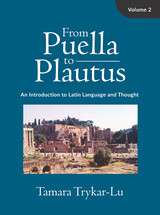
From Puella to Platus
An Introduction to Latin Language and Thought, Volume 2
Tamara Trykar-Lu
Catholic University of America Press, 2019
Whether to enlarge your general education, improve your English, or just because you are curious about the society that has had such a lasting influence on our history, our language, our thoughts, and our culture, you should and can learn Latin.
Tamara Trykar-Lu's charming and delightful introduction to Latin, From Puella to Plautus, Part I, is designed for beginning to intermediate Latin study, at the high school or college level, either with the aid of a teacher and classroom or simply for personal enjoyment and enrichment. A thorough review of English grammar with detailed explanations makes it easy for the reader to grasp new concepts in Latin. Learning Latin vocabulary becomes manageable once you realize how much ‘Latin’ vocabulary there is in English. You will quickly learn to read Latin with short stories and, gradually, more demanding selections. Readers will translate the story of Romulus and Remus and the founding of Rome, but also the tale of Nivea -- Snow White -- and some parts of Shakespeare's plays. Short sections show how English developed, how Latin influenced it, and where they both belong in the world of languages.
Each chapter ends with a brief outline of some aspect of Roman culture, such as housing, fauna and flora, games, crafts, water supply, and cooking – with recipes. And last but not least there are informative tidbits, drawings, cartoons, jokes, riddles, crossword puzzles, and, of course, pictures distributed throughout the book. For while foreign-language study should be logical, coherent, and rigorous, it need not be heavy-handed or pedantic, and certainly not dull. Ideal for use in courses or for brushing up your language skills, From Puella to Plautus is a lively and engaging book about the Latin language and life in the Roman Empire.
[more]
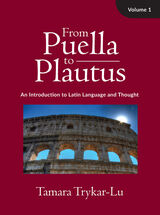
From Puella to Plautus
An Introduction to Latin Language and Thought, Volume 1
Tamara Trykar-Lu
Catholic University of America Press, 2019
Whether to enlarge your general education, improve your English, or just because you are curious about the society that has had such a lasting influence on our history, our language, our thoughts, and our culture, you should and can learn Latin.
Tamara Trykar-Lu's charming and delightful introduction to Latin, From Puella to Plautus, Part I, is designed for beginning to intermediate Latin study, at the high school or college level, either with the aid of a teacher and classroom or simply for personal enjoyment and enrichment. A thorough review of English grammar with detailed explanations makes it easy for the reader to grasp new concepts in Latin. Learning Latin vocabulary becomes manageable once you realize how much ‘Latin’ vocabulary there is in English. You will quickly learn to read Latin with short stories and, gradually, more demanding selections. Readers will translate the story of Romulus and Remus and the founding of Rome, but also the tale of Nivea -- Snow White -- and some parts of Shakespeare's plays. Short sections show how English developed, how Latin influenced it, and where they both belong in the world of languages.
Each chapter ends with a brief outline of some aspect of Roman culture, such as housing, fauna and flora, games, crafts, water supply, and cooking – with recipes. And last but not least there are informative tidbits, drawings, cartoons, jokes, riddles, crossword puzzles, and, of course, pictures distributed throughout the book. For while foreign-language study should be logical, coherent, and rigorous, it need not be heavy-handed or pedantic, and certainly not dull. Ideal for use in courses or for brushing up your language skills, From Puella to Plautus is a lively and engaging book about the Latin language and life in the Roman Empire.
[more]
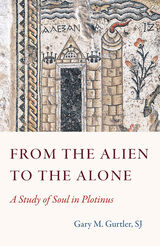
From the Alien to the Alone
A Study of Soul in Plotinus
Gary M. Gurtler, SJ
Catholic University of America Press, 2022
Plotinus is often accused of writing haphazardly, with little concern for the integral unity of a treatise. By analyzing each treatise as a whole, From the Alien to the Alone finds much evidence that he constructed them skillfully, with the parts working together in subtle ways. This insight was also key in translating several central passages by considering the flow of the argument as a whole to shed light on the difficulties in these passages as well as reveal the structure often latent in particular treatise. The volume also serves to clarify Plotinus’ rich use of images. Commentators, for instance, tend to take the images of light and warmth to explain the relation of soul and body as in conflict, with light casting out warmth. A close look at the text, however, reveals that Plotinus uses each image to correct the limitations of the other. Thus, since the soul is incorporeal, it is actually more transcendent than light and as activating the body is more completely present than warmth. Similarly, recent commentators are quick to take the related impassibility of the soul as implying a Cartesian gap between body and soul. The problem Plotinus faces, however, is that his description of the soul’s pervasive presence in the body jeopardizes its impassibility as in the intelligible. His effort then is actually to introduce a gap that preserves the soul’s nature, rather than overcome a gap that would make the very existence of the body problematic.
While this work confirms much recent scholarly consensus on Plotinus, many of Gurtler's interpretations and general conclusions give constructive challenges to some existing modes of understanding Plotinus’ thought. The arguments and their textual evidence, with the accompanying Greek, provide the reader with direct evidence for testing these conclusions as well as appreciating the nature of Plotinus’ philosophizing.
[more]
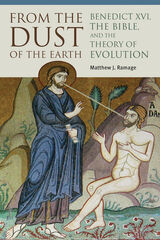
From the Dust of the Earth
Benedict XVI, the Bible , and the Theory of Evolution
Matthew J. Ramage
Catholic University of America Press, 2022
The claim that evolution undermines Christianity is standard fare in our culture. Indeed, many today have the impression that the two are mutually exclusive and that a choice must be made between faith and reason—rejecting Christianity on the one hand or evolutionary theory on the other. Is there a way to square advances in this field of study with the Bible and Church teaching?
In this book—his fourth dedicated to applying Joseph Ratzinger/Benedict XVI’s wisdom to pressing theological difficulties—Matthew Ramage answers this question decidedly in the affirmative. Distinguishing between evolutionary theory properly speaking and the materialist attitude that is often conflated with it, Ramage’s work meets the challenge of evolutionary science to Catholic teaching on human origins, guided by Ratzinger’s conviction that faith and evolutionary theory mutually enrich one another.
Pope Benedict gifted the Church with many pivotal yet often-overlooked resources for engaging evolution in the light of faith, especially in those instances where he addressed the topic in connection with the Book of Genesis. Ramage highlights these contributions and also makes his own by applying Ratzinger’s principles to such issues as the meaning of man’s special creation, the relationship between sin and death, and the implications of evolution for eschatology. Notably, Ramage shows that many apparent conflicts between Christianity and evolutionary theory lose their force when we interpret creation in light of the Paschal Mystery and fix our gaze on Jesus, the New Adam who reveals man to himself.
Readers of this text will find that it does more than merely help to resolve apparent contradictions between faith and modern science. Ramage’s work shows that discoveries in evolutionary biology are not merely difficulties to be overcome but indeed gifts that yield precious insight into the mystery of God’s saving plan in Christ.
[more]
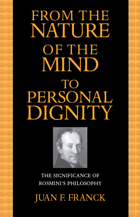
From the Nature of the Mind to Personal Dignity
The Significance of Rosmini's Philosophy
Juan F. Franck
Catholic University of America Press, 2006
This book is the first philosophical study in English devoted to Antonio Rosmini (1797-1855) for over a century.
[more]
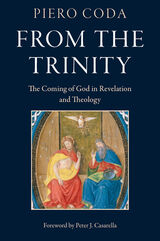
From the Trinity
The Coming of God in Revelation and Theology
Piero Coda
Catholic University of America Press, 2020
From the Trinity provides an overall view of the history and the philosophical and theological significance of God the Trinity, not only from a religious point of view but from an anthropological and socio-cultural view as well. The perspective is that of Christian doctrine, specifically Catholic, in dialogue with the cultural sensitivity of our times and with the religious pluralism that characterizes it.
Following the generative-progressive method proposed by Vatican II, the book begins with a phenomenological reading of the signs of the times, with special focus upon the performative aspect of the announcement and the doctrine of faith. In particular, constant attention to the contribution made by the mystics and great charisms (from Augustine of Hippo to Francis of Assisi and Theresa of Avila up until Therese of Lisieux, Edith Stein and Chaira Lubich) toward a deeper understanding of the Trinitarian truth.
From the Trinity is unique in what it offers not only for Trinitarian theology, but also for other theological disciplines (Christology, Pneumatology, Anthropology, Ecclesiology, etc.) – in which the Trinity shines forth as the central and enlightening truth – as well as for philosophy, the humanities and the natural sciences. This perspective is especially developed in terms of a Trinitarian ontology (see Part V) by which reality is understood in light of the revelation of the Trinity. The implications of the incarnation of the Son of God and the gift of the Holy Spirit are taken seriously in studying the truth of all things as they are perceived in the space created by living and thinking “in” Jesus, united to the Father in the Spirit, as suggested by the title of the book, looking upon reality “From the Trinity.”
[more]
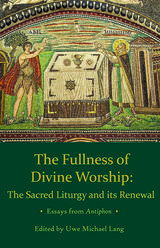
The Fullness of Divine Worship
The Sacred Liturgy and its Renewal
Uwe Michael Lang
Catholic University of America Press, 2018
This volume offers a selection of essays from the pages of Antiphon: A Journal for Liturgical Renewal, the official organ of the Society for Catholic Liturgy. The Society was founded in 1995 as a multidisciplinary association of Catholic scholars, teachers, pastors, and ecclesiastical professionals in the Anglophone world, with the aim of promoting the scholarly study and practical renewal of the sacred liturgy.
[more]
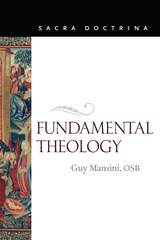
Fundamental Theology
Guy Mansini, OSB
Catholic University of America Press, 2018
Fundamental Theology examines the light by which the mysteries of Christ and the Church, the Trinity and the Sacraments, are revealed to us. That light we call "revelation," and fundamental theology examines in the first place what this light shows about itself, and how it is sustained in the world. Or again, fundamental theology considers what the word of God has to say both about itself and what it has to say about where in the world it is to be heard. So, first it is a theology of Revelation (chapter 1), and second, a theology of the transmission of Revelation in Tradition, Scripture, and the Church (chapters 2, 3, and 4). Why must Revelation have the shape it does, and why must it be constituted by both word and event? Why is Tradition prior to Scripture, why must the word of God be written down, and why must Scripture come to us in two testaments? And why must the message conveyed in Tradition and Scripture have a living interpreter in the Church?
Since no word is spoken unless it is heard, fundamental theology also investigates the conditions of hearing the word of God, the very hearing itself in the assent of faith, and a necessary consequence of this hearing. The remote conditions of hearing are also what theology calls our ability to come to the knowledge of the preambula fidei- the things about God than can be known by the natural light (chapter 5). The immediate condition of hearing is the credibility of the word (chapter 6). Hearing is faith (chapter 7). And true hearing gives the hearer to recapitulate what is heard in his own wondering and thankful voice in theology (chapter 8). The introduction to theology in the last chapter is by way of considering the history of Catholic theology in the 20th century.
Since no word is spoken unless it is heard, fundamental theology also investigates the conditions of hearing the word of God, the very hearing itself in the assent of faith, and a necessary consequence of this hearing. The remote conditions of hearing are also what theology calls our ability to come to the knowledge of the preambula fidei- the things about God than can be known by the natural light (chapter 5). The immediate condition of hearing is the credibility of the word (chapter 6). Hearing is faith (chapter 7). And true hearing gives the hearer to recapitulate what is heard in his own wondering and thankful voice in theology (chapter 8). The introduction to theology in the last chapter is by way of considering the history of Catholic theology in the 20th century.
[more]
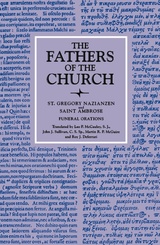
Funeral Orations
Saint Gregory Nazianzen
Catholic University of America Press, 1953
No description available
[more]
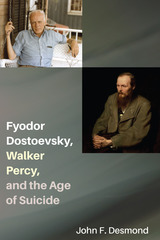
Fyodor Dostoevsky, Walker Percy, and the Age of Suicide
John F. Desmond
Catholic University of America Press, 2019
Fyodor Dostoevsky, Walker Percy, and the Age of Suicide is a study of the phenomenon of suicide in modern and post-modern society as represented in the major fictional works of Fyodor Dostoevsky and Walker Percy. In his study, suicide is understood in both a literal and spiritual sense as referring to both the actual suicides in their works and to the broader social malaise of spiritual suicide, or despair. In the 19th century Dostoevsky called suicide “the terrible question of our age”. For his part, Percy understood 20th century Western culture as “suicidal” in both its social, political and military behavior and in the deeper sense that its citizenry had suffered an ontological “loss of self” or “deformation” of being. Likewise, Thomas Merton called the 20th century an “age of suicide”.
[more]
READERS
Browse our collection.
PUBLISHERS
See BiblioVault's publisher services.
STUDENT SERVICES
Files for college accessibility offices.
UChicago Accessibility Resources
home | accessibility | search | about | contact us
BiblioVault ® 2001 - 2024
The University of Chicago Press









